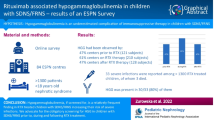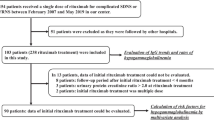Abstract
Background
Rituximab (RTX) is a promising strategy for treating steroid-dependent idiopathic nephrotic syndrome (SDNS). RTX induces profound B-cell depletion, suggesting hypogammaglobulinemia as a potential side effect after long-term treatment.
Patients and methods
We analyzed immunoglobulin G (IgG) levels in 12 pediatric patients on RTX with a B-cell depletion of a minimum of 3 months and compared the results to 16 patients on orally administered immunosuppressive drugs, such as mycophenolate mofetil (MMF) and/or cyclosporine A (CyA). All patients were in stable remission of SDNS at the time of IgG analysis.
Results
IgG levels in the RTX group before RTX introduction were 6.2 ± 1.0 g/L and were not significantly different from the MMF/CyA group (8.2 ± 2.5 g/L). In the MMF/CyA group, five patients had at least one episode of hypogammaglobulinemia. In two of them, this episode was prolonged (>3 months), and only one required IgG supplementation. In the RTX group, eight patients had decreased IgG levels before RTX infusion. After RTX, hypogammaglobulinemia persisted in seven among those eight patients. No decreased IgG plasma levels were noted in patients with normal baseline IgG levels before RTX treatment.
Conclusion
RTX does not seem to directly induce decreased IgG levels in patients with SDNS, but it seems to prolong a preexisting low IgG levels.


Similar content being viewed by others
References
Benz K, Dotsch J, Rascher W, Stachel D (2004) Change of the course of steroid-dependent nephrotic syndrome after rituximab therapy. Pediatr Nephrol 19:794–797
Guigonis V, Dallocchio A, Baudouin V, Dehennault M, Hachon-Le Camus C, Afanetti M, Groothoff J, Llanas B, Niaudet P, Nivet H, Raynaud N, Taque S, Ronco P, Bouissou F (2008) Rituximab treatment for severe steroid- or cyclosporine-dependent nephrotic syndrome: a multicentric series of 22 cases. Pediatr Nephrol 23:1269–1279
Francois H, Daugas E, Bensman A, Ronco P (2007) Unexpected efficacy of rituximab in multirelapsing minimal change nephrotic syndrome in the adult: first case report and pathophysiological considerations. Am J Kidney Dis 49:158–161
Dotsch J, Muller-Wiefel DE, Kemper MJ (2008) Rituximab: is replacement of cyclophosphamide and calcineurin inhibitors in steroid-dependent nephrotic syndrome possible? Pediatr Nephrol 23:3–7
Gilbert RD, Hulse E, Rigden S (2006) Rituximab therapy for steroid-dependent minimal change nephrotic syndrome. Pediatr Nephrol 21:1698–1700
Hofstra JM, Deegens JK, Wetzels JF (2007) Rituximab: effective treatment for severe steroid-dependent minimal change nephrotic syndrome? Nephrol Dial Transplant 22:2100–2102
Peters HP, van de Kar NC, Wetzels JF (2008) Rituximab in minimal change nephropathy and focal segmental glomerulosclerosis: report of four cases and review of the literature. Neth J Med 66:408–415
Kamei K, Ito S, Nozu K, Fujinaga S, Nakayama M, Sako M, Saito M, Yoneko M, Iijima K (2009) Single dose of rituximab for refractory steroid-dependent nephrotic syndrome in children. Pediatr Nephrol 24:1321–1328
Sellier-Leclerc AL, Macher MA, Loirat C, Guerin V, Watier H, Peuchmaur M, Baudouin V, Deschenes G (2010) Rituximab efficiency in children with steroid-dependent nephrotic syndrome. Pediatr Nephrol 25:1109–1115
Sellier-Leclerc AL, Baudouin V, Kwon T, Macher MA, Guerin V, Lapillonne H, Deschenes G, Ulinski T (2012) Rituximab in steroid-dependent idiopathic nephrotic syndrome in childhood–follow-up after CD19 recovery. Nephrol Dial Transplant 27:1083–1089
Cambridge G, Leandro MJ, Edwards JC, Ehrenstein MR, Salden M, Bodman-Smith M, Webster AD (2003) Serologic changes following B lymphocyte depletion therapy for rheumatoid arthritis. Arthritis Rheum 48:2146–2154
Leandro MJ, Cambridge G, Edwards JC, Ehrenstein MR, Isenberg DA (2005) B-cell depletion in the treatment of patients with systemic lupus erythematosus: a longitudinal analysis of 24 patients. Rheumatology (Oxford) 44:1542–1545
Diwakar L, Gorrie S, Richter A, Chapman O, Dhillon P, Al-Ghanmi F, Noorani S, Krishna MT, Huissoon A (2010) Does rituximab aggravate pre-existing hypogammaglobulinaemia? J Clin Pathol 63:275–277
Corales R, Chua J, Mawhorter S, Young JB, Starling R, Tomford JW, McCarthy P, Braun WE, Smedira N, Hobbs R, Haas G, Pelegrin D, Majercik M, Hoercher K, Cook D, Avery RK (2000) Significant post-transplant hypogammaglobulinemia in six heart transplant recipients: an emerging clinical phenomenon? Transpl Infect Dis 2:133–139
Ganschow R, Englert C, Grabhorn E, Richter A, Hinrichs B, Broering DC, Rogiers X, Burdelski M (2005) Hypogammaglobulinemia in pediatric liver transplant recipients. Pediatr Transplant 9:215–219
Author information
Authors and Affiliations
Corresponding author
Rights and permissions
About this article
Cite this article
Delbe-Bertin, L., Aoun, B., Tudorache, E. et al. Does rituximab induce hypogammaglobulinemia in patients with pediatric idiopathic nephrotic syndrome?. Pediatr Nephrol 28, 447–451 (2013). https://doi.org/10.1007/s00467-012-2361-z
Received:
Revised:
Accepted:
Published:
Issue Date:
DOI: https://doi.org/10.1007/s00467-012-2361-z




